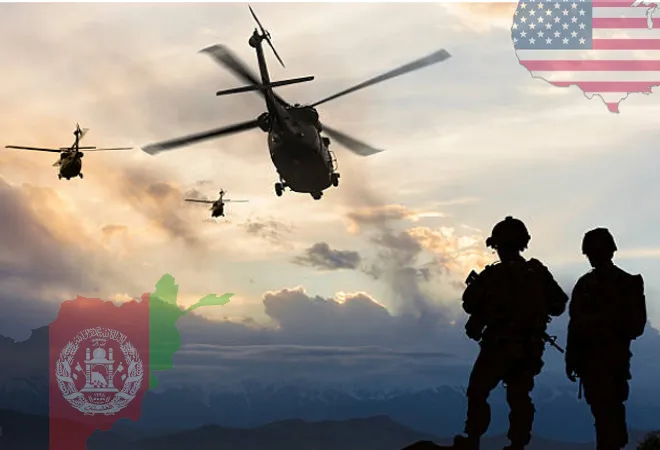-
CENTRES
Progammes & Centres
Location
What the US leadership must consider as it has beat a hasty and embarrasing retreat from Afghanistan
 This article is part of ORF's Research and Analyses on the unfolding situation in Afghanistan since August 15, 2021.
This article is part of ORF's Research and Analyses on the unfolding situation in Afghanistan since August 15, 2021.
Another great power retreats from Afghanistan. This embarrassing exercise for the United States of America (US) raises several important questions with regard to its militaristic world view and leadership of the existing world order. Scholars have decried Afghanistan as the graveyard of empires for centuries, but the US has thrived for more than a century on a bedrock of wars and weapons. What is the significance of this retreat from Afghanistan for international relations?
Scholars have decried Afghanistan as the graveyard of empires for centuries, but the US has thrived for more than a century on a bedrock of wars and weapons.
If the failure to anticipate the 9/11 attack is regarded as an intelligence failure, then the miscalculation when it comes to the swift take back of power by the Taliban in Afghanistan should be regarded as one as well. These repeated miscalculations based on time and speed should not be taken lightly or become another persistently opportunistic exercise in a fractious blame game between the two political parties in the US. On the contrary, this is the time to acknowledge how political divisiveness is weakening the ability of democratic processes to hold these military and intelligence actors accountable and effective. It also should not be another exercise in rendering a simplistic caricature and misrepresenting the people in Afghanistan as incompetent, corrupt, backward, and beyond redemption. These repeated replays of domestic and international political and cultural wars only reinforce civilisational stereotypes based on intersecting dynamics of denial and dynamics of difference. This stalemate within the US has been perpetuated with billions of dollars from taxpayers’ resources to maintain the status quo.
President’s Biden’s speech was a sanitised and hypocritical attempt at suggesting that the US policy in waging the ‘War on Terror’ was in its goals and exit strategy.
The need of the hour is to exercise patience and allow actors, who have been in isolation and treated like pariah for decades, an opportunity for dialogue and engagement. This is possible only if the democratic institutions in the West stick to reporting without sensationalising developments in Afghanistan and the political leadership stop scuttling opportunities in this swift transition of power in Afghanistan. Unfortunately, President’s Biden’s speech was a sanitised and hypocritical attempt at suggesting that the US policy in waging the ‘War on Terror’ was in its goals and exit strategy. His effort to ‘save face’ in addressing the domestic audiences and allies overseas by putting the blame entirely on the Afghans is humiliating and rubbing salt into old wounds. This rhetoric did not inspire much confidence in the veracity of statements and the swift walk away from the podium without taking a single question from his own press reinforced the image of a fragmented and weak institutional authority in the US. The Trump administration had already bypassed the Afghan government and deprived it of any shred of legitimacy when it reached an agreement with the Taliban. Biden’s speech did provide the necessary cue to the NATO allies to follow the same course as indicated by the NATO Chief Jon Stoltenberg’s speech the next day blaming the former President of Afghanistan Ashraf Ghani for fleeing the country and then acknowledging flaws in military training programs.
The Taliban has tried to demonstrate that it has regained power without any bloodshed on the streets of Afghanistan and that it does not intend to target civilians.
The asymmetry and weaknesses in the military training programmes and humanitarian aid and development programmes in Afghanistan have been well-documented for decades by scholars and journalists reporting from the ground. It is only with the Taliban back in the saddle that swift attempts are being made to divert enormous amounts of funding from the military towards humanitarian aid. The flow of this humanitarian aid will now be susceptible to the conditions of dialogue between the Taliban and the West. The Taliban has tried to demonstrate that it has regained power without any bloodshed on the streets of Afghanistan and that it does not intend to target civilians. It has issued statements that the war is over and within the ambit of Islamic laws, the protection and rights of women will be safeguarded. These feeble attempts are met with skepticism by the authorities and political commentators in the West. This willingness to scoff at the Taliban when it tries to present a moderate face is understandable considering the gross and gruesome history of its initial reign of power in Afghanistan, but does ridiculing, lampooning, and harshly criticising the Taliban and denying it any legitimacy as a pre-condition to dialogue hold a better promise for change in conditions of vulnerable populations in Afghanistan?
The deplorable treatment of minorities and women in Pakistan is a subject that has never been a condition for re-thinking the alliance.
It is this question that the leadership in the West must wrestle with as decades of waging war and relying on aerial warfare to demonstrate its dominance has yielded little. On the contrary, these strategies have increasingly isolated and alienated the US. This is not to suggest that we fall back on previous practices of waging proxy wars by great powers and backing factions in another civil war amongst warlords. The Taliban has demonstrated its competence to unite disparate groups and emerge as the dominant authority in Afghanistan. China, Russia, Iran, and Syria have already expressed their willingness for dialogue with the Taliban. Pakistan has always played the Taliban and the US to its own advantage to maintain its seat as the key mediator between these two parties in shaping the future of Afghanistan. Osama Bin Laden, after all, was found and killed in Pakistan and not Afghanistan. The deplorable treatment of minorities and women in Pakistan is a subject that has never been a condition for re-thinking the alliance. It is time for the US to reconsider whether it will again be played by its own so called regional allies in Asia or whether it will be willing to reconfigure its own course of action vis-à-vis the Taliban. This decision will weigh heavy as the road ahead is difficult and treacherous but necessary to walk in an exercise of leadership.
The views expressed above belong to the author(s). ORF research and analyses now available on Telegram! Click here to access our curated content — blogs, longforms and interviews.

Ritu Mathur is associate professor of political science University of Texas at San Antonio.
Read More +